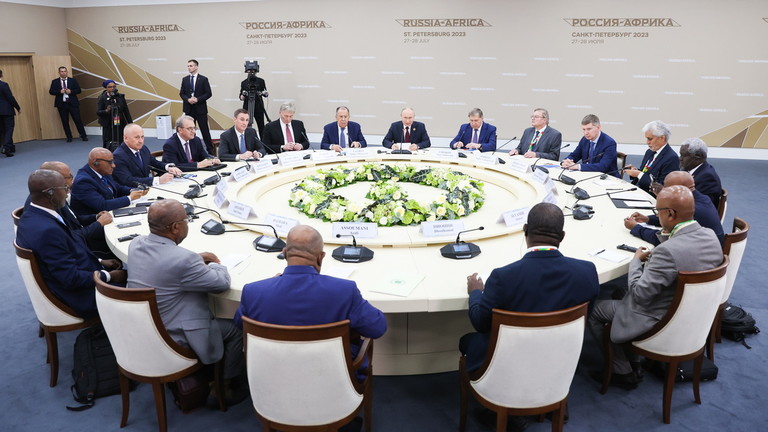Uncategorized
African Union’s Voice for Restoration of Black Sea Grain Deal Stripes on Russian Rocks

African delegates to the second Russia-Africa summit held in St. Petersburg July 27-28 expressed sadness over Russia’s fierce resistance to renew its membership of the Black Sea grain deal that allowed Ukraine to export grain through its Black Sea ports to the world, reports Kestér Kenn Klomegâh from St. Petersburg, Russia..
The African Union, the continental organization, has passionately called for an “urgent” restoration of the Black Sea grain deal with Russian President Vladimir Putin. “The problem of grains and fertilizers concerns everyone,” Comoros President Azali Assoumani, who currently heads the African Union, said at a summit with Russia in St. Petersburg.
African countries are asking that the delivery of Russian and Ukrainian grain to the continent be made easier, President of the African Union and President of the Comoros Azali Assoumani and African Union Commission Chairman Moussa Faki Mahamat said.
“The Ukrainian crisis is having a major impact, so resolving this crisis will save the lives of a large number of people who depend on these food supplies. Our continent is currently being severely impacted by food prices. Therefore, we urge all stakeholders to facilitate the delivery of both Ukrainian and Russian grain to our countries,” Assoumani pointed out.
This conflict affected the entire world in a negative way, African Union Commission Chairman Moussa Faki Mahamat said. “Of course, we are concerned over the grain supply issue,” he said, adding that it is “necessary to immediately and promptly resolve the problem of food shipments to countries in need.”
South African President Cyril Ramaphosa and Senegalese counterpart, Macky Sall, raised this question when the group presented the peace plan last June in St. Petersburg. A number of other African delegates during the summit raised this question.
Earlier, Egyptian President Abdel Fattah el-Sisi also added his voice, urging the Kremlin to revive the deal that allowed Ukraine to export grain from its seaports. Sisi said during the summit that an agreement was “essential.”
Back in New York, United Nations Secretary-General Antonio Guterres has also held a meeting with Russian Deputy Foreign Minister Sergei Vershinin to discuss the grain deal, UN spokesperson Stephane Dujarric said at a briefing on Friday.
“The Secretary General met with Russian Deputy Foreign Minister Vershinin in Rome on Tuesday morning and, first of all, he has called Russia to rejoin the Black Sea Initiative and also reiterated his commitment to doing whatever he can to facilitate the trade in Russian and Ukrainian food and fertilizer,” Dujarric said.
Guterres said he would continue to maintain contact with all parties involved regarding the possibility of restoring the Black Sea grain initiative. He said he is committed to agreements that could be in the interests of Kiev and Moscow.
“We will go on with all our contacts, with all parties – Turkey, Ukraine, Russia and other countries that are relevant from the point of view of the global markets in order to reestablish the Black Sea Initiative,” Guterres said at a press conference at the UN’s headquarters.
Russia pulled out of the deal on July 17 and warned that it will attack all ships going to and from Ukrainian ports. Russian missiles also destroyed more than 60,000 tons of Ukrainian grain in Odessa.
Russia has been bombarding Ukrainian agriculture infrastructure daily since the end of the deal. Ukraine is a major agricultural producer whose exports are a noteworthy pillar of food security in many countries around the world. Exporting grain overland through Europe created controversy with farmers in those countries, whose markets became flooded with cheap grain.
The termination of the deal would affect a number of countries in the Middle East, North Africa and Southeast Asia. Due to the limited transport capacity and infrastructure in Central and Eastern Europe, a significant part of the land export of grain from Ukraine may get stuck in transit countries, which have their local producers of this agricultural product.
The Black Sea agreement has helped keep benchmark prices of the foodstuff under control by boosting supply to world markets. On July 17, Russia officially announced its withdrawal from the grain agreement after an attack at the Crimean Bridge. In addition, Moscow withdrew guarantees of navigation safety in the Black Sea. The UN-brokered Black Sea grain deal expired on July 18. Report by Thepressradio.com representative Kestér Kenn Klomegâh in St Petersburg, Russia.
Source: Thepressradio.com





